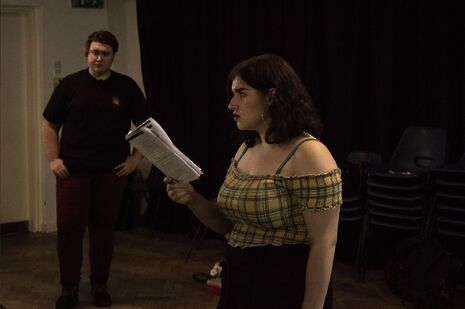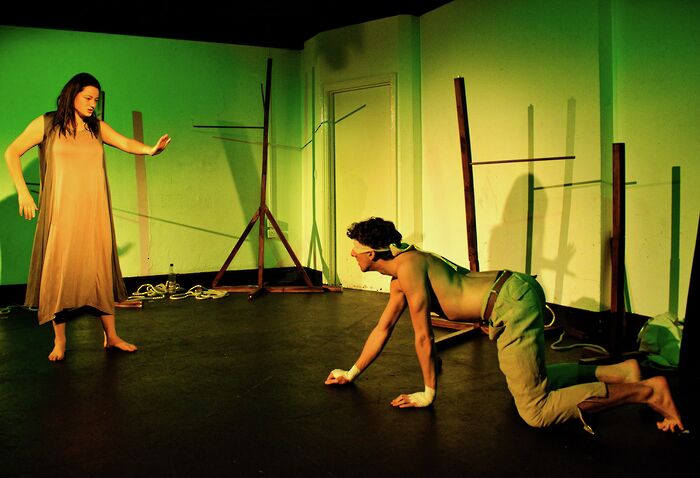The Children’s Hour preview
A cathartic rehearsal process has led to this internalised reinvention of a lesser-known classic

‘It was ashamed, and sad at being ashamed.’ These are the words spoken by Karen (Saskia West) to Joe (Jamie Sayers) in the final act of Lillian Hellman’s ‘The Children’s Hour’. She describes her husband’s response to the accusations that Karen and Martha (Jessica Murdoch) are having a homosexual relationship, but by quoting these words, by evoking society’s attitude towards the two women and their love, I am misreading director Katie Woods’ vision of the play.
What Woods wants to draw out in her production is the individualism of the experience that these two women face in the play, moving away from the community aspect and exploring instead Martha’s feelings of self-disgust, the internal struggle she faces when she realises that she is in love with her best friend. Woods directs me to Shirley MacLaine’s comment after her role in the film version: she said that the action of the play wouldn’t happen today because Martha would fight for her right to love.
"As I walked... what I was later told is one of the play’s most tragic scenes, and the cast’s investment in this intensity was very apparent"
What Woods and her cast are arguing instead is that, faced with such complexity of emotion, Martha actually might not fight for love. The individualised, internalised aspect of the story is easier to overlook, more difficult to try and open up to a whole audience – but it will, tragically, always be painfully relevant.
It is this intensity of emotion that West finds so exciting about the play: rehearsals have been spent trying to make sense of all of the different feelings that Karen and Martha experience, the complexities and contradictions both challenging (particularly within the short turnaround time that Cambridge theatre offers) but also incredibly rewarding as an actor. As I walked into the rehearsal room, West and Sayers were in the middle of what I was later told is one of the play’s most tragic scenes, and the cast’s investment in this intensity was very apparent. It seemed almost wrong for Woods and assistant directors Jamie Edwards and Milo Callaghan to add their directorial comments – a spell had been cast over the room.
For Woods, as she tells me, the most exciting part has been putting her own stamp on the play, most literally perhaps, by adding scenes in between the existing ones. The cast have devised movement sequences to fill in the holes in the narrative, responding to criticisms of the play which condemn the final scenes for escalating too quickly and making the pace of the action and the emotional trajectories more believable.
There is a lighter side to this play, however. The opening scene, which I also saw in rehearsal, has a very different feel. Eleanor Lind Booton is hilarious in her role as the over-zealous schoolteacher who wishes she was an actress, trying to drill ‘the immortal words of the immortal Bard’ into the children in her class. These classroom scenes are high in energy, scattered with Cicero, Pope and Shakespeare, evoking perfectly the chaos and personality clashes of the schoolroom.
This cast and crew have put their own twist on an under-rated classic, turning it away from a comment on society and into a discussion of dangerous risk of internalisation that is the result of years and years of ostracization. While the atmosphere in the rehearsal room was warmly energetic, West and Woods describe the rehearsal process as cathartic, as working through the emotions of the characters has meant something different to each of them. This has been a process of collaboration, of openness, and hopefully the final product will be something that, even eighty years on from its first performance, will resonate with every single one of us.
 Features / Are you more yourself at Cambridge or away from it? 27 January 2026
Features / Are you more yourself at Cambridge or away from it? 27 January 2026 News / Vigil held for tenth anniversary of PhD student’s death28 January 2026
News / Vigil held for tenth anniversary of PhD student’s death28 January 2026 Interviews / Lord Leggatt on becoming a Supreme Court Justice21 January 2026
Interviews / Lord Leggatt on becoming a Supreme Court Justice21 January 2026 News / Reform candidate retracts claim of being Cambridge alum 26 January 2026
News / Reform candidate retracts claim of being Cambridge alum 26 January 2026 Comment / How Cambridge Made Me Lose My Faith26 January 2026
Comment / How Cambridge Made Me Lose My Faith26 January 2026










